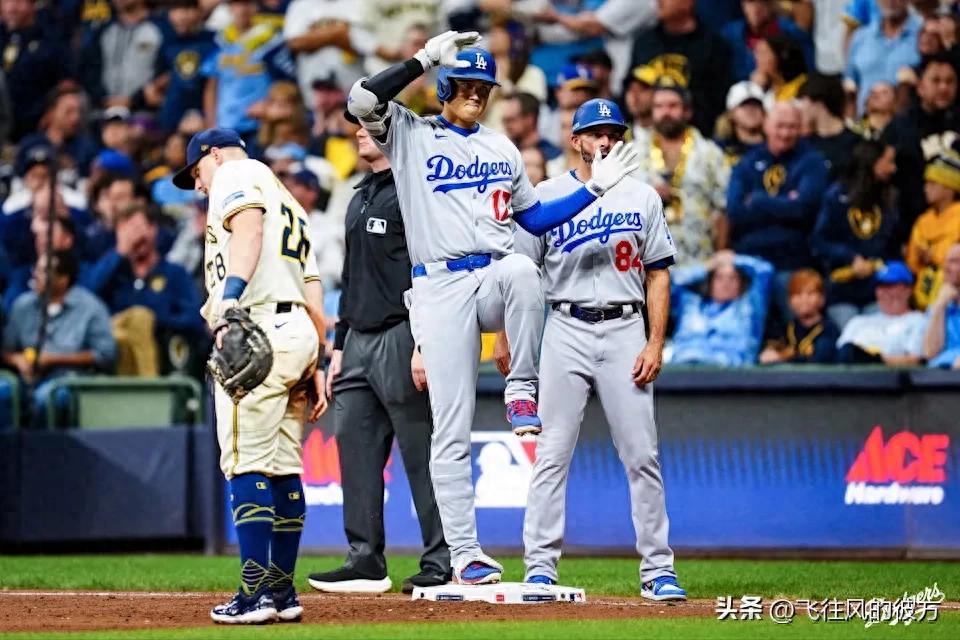Shohei Ohtani's hitting slump affects Dodgers' title defense; MLB official site analyzes three main reasons

Shohei Ohtani of the Los Angeles Dodgers has played 8 postseason games so far, hitting just .147 with 2 home runs, 6 RBIs, 1 stolen base, and an OPS of 0.599. MLB's official website breaks down the causes of Ohtani's hitting struggles, citing his two-way role, swing decisions, and changes in pitchers' attack strategies.
Ohtani shined in the Wild Card series against the Reds with 2 home runs and 4 RBIs; however, in the Division Series, he managed only 1 hit in 18 at-bats and struck out 9 times; then in the first two games of the National League Championship Series, across 6 games, he had 25 at-bats with just 2 hits, a batting average of .080, 2 RBIs, 5 walks, and 12 strikeouts.
Despite the poor surface stats, both of his hits drove in runs, and he was intentionally walked several times, indirectly helping Mookie Betts earn a bases-loaded walk and score a run.
Before the NLCS began, Dodgers manager Dave Roberts admitted concern over Ohtani's hitting struggles: "With that kind of performance, we can't win the World Series." Yet, the Dodgers currently lead the NLCS 2-0 over the Brewers and return home with strong momentum.
Roberts believes Ohtani's plate appearances in the NLCS have improved in quality, but he knows the star still has more potential. He reiterated his earlier point: "Contribution isn't just about batting average. As long as he gets on base, draws walks, and gives Mookie opportunities to drive in runs, that's a contribution. But we still have a way to go to win the World Series."
MLB's official website analyzes several potential reasons for Ohtani's slump:
First is the "two-way" role: Although Ohtani has long been a two-way player, this season he is recovering from a second major right elbow surgery. Last season, he focused solely on hitting. When pitching as a starter this season (54 at-bats, 12 hits, .222 average) and playing the next day (34 at-bats, 5 hits, .147 average), his hitting performance noticeably declined.
However, this factor has less impact in the postseason since he has only started one game pitching so far. In Game 1 of the NLDS, he pitched a quality start but went 0-for-4 with 4 strikeouts at the plate. He did not play the following day as it was an off day.
Ohtani is expected to pitch again in Game 4 of the NLCS. If the Brewers win at least one game in Los Angeles, he may have to bat the next day.
He himself does not believe his two-way recovery is related to the hitting slump: "I don't think pitching has affected my hitting. When pitching, as long as I can control myself, I feel I can perform well. Hitting depends on stance and mechanics, which I am continuously adjusting."
Second is swing decisions
Roberts pointed out that one main reason for Ohtani's recent slump is his "swing judgment." In the playoffs, his swing rate at borderline pitches (within one baseball width of the strike zone edge) has significantly increased.
While the league-wide average swing rate changes little between regular season and playoffs, Ohtani's swing rate rose from 43.7% to 52.1%, the highest among 57 hitters with over 75 plate appearances in the postseason.
This is critical because the quality of contact on borderline pitches is much lower than on pitches in the center of the strike zone.
Regular season: Batting average .363 / slugging .870 on pitches in the center of the strike zone (average exit velocity 99.2 mph)
Borderline zone: Batting average .251 / slugging .516 (average exit velocity 92.1 mph)
Third is changes in pitchers' attack strategies
Although the overall proportions of fastballs, breaking balls, and off-speed pitches remain similar to the regular season, opponents have noticeably increased the use of four-seam fastballs and sinkers in the playoffs.
The percentage of four-seamers and sinkers faced rose from 43.7% to 49.3%, with sinkers usage surging from 13.8% to 27.1%.
While Ohtani handled these pitches effectively during the regular season, his postseason performance against them has declined significantly.
Such a slump is extremely rare for Ohtani, so the general consensus is that he just needs time to adjust and will eventually regain form. Meanwhile, the Dodgers have continued to perform well, winning 5 of 6 games since his slump began.
Ohtani expressed gratitude for the coach's trust: "If anything, I feel he is showing confidence that as long as I perform well, we can win. So I will do my best to achieve that."


Wonderfulshortvideo
JJK openings are all BANGERS 🔥


YOU’RE NOT GONNA UNDERSTAND 😫 IT’S BTS ‼️ IT’S BTS ARMY🫰


thinking about the cottage <3


When you’re on a field trip at Dodger Stadium and Kyle Tucker waves to you. 🥹


A message from King Tuck!


THE WAIT IS ALMOST OVER! 😭


Tatsuya Imai with a message to @Houston Astros fans! ☄️








 Links
Links
 Contact
Contact
 App
App


